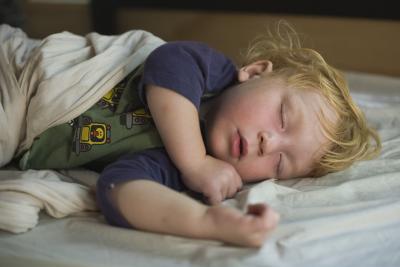Toddlers are just reaching the age where they realize they have some power. If your toddler ever tells you, “No,” you are aware of this. Going to sleep is one area that your toddler may try to control. Some toddlers also have trouble falling asleep and staying asleep. Regardless of the reason, toddler sleep disorders can put everyone on edge. The good news is that solutions to your toddler’s sleep difficulties do exist.
Not Sleeping All Night
Many toddlers wake up during the night and call out for you. Sometimes, this happens when your toddler is sick or teething and is only temporary. If the waking is not because of that, maybe your toddler is taking too long a nap during the day, suggests WebMD. Try shortening the daytime nap or putting your toddler to bed 15 to 20 minutes later so that your child is more tired at night. You can go in when you child calls to you, but if this is happening every night, delay going to the room by five minutes each night.
Not Going to Bed
Some children stretch the bedtime routine for hours, which can be stressful. Kids pick up on the stress, which prolongs the bedtime ritual even longer, according to WebMD. The solution is to make sure the bedtime routine is relaxing and positive. Have a set routine each night, which could consist of a bath, putting on pajamas, brushing teeth and reading a bedtime story or singing a lullaby. The whole process should take about 20 or 30 minutes.
Crying After Going to Bed
Your toddler needs to learn how to put himself to sleep. If he cries as soon as you leave the room, tell him that you will come back to check on him as soon as he calms down, Dr. Brett Kuhn, a psychologist at the Children’s Sleep Center in Nebraska, told the Parents website. Return as you promised, but don’t linger in the room while he is crying.
Nightmares or Night Terrors
Nightmares can scare toddlers. Reassure your child that she is safe. During the day, you can have your child draw a picture or discuss the nightmare with you. Talking it through during the day can help stop the nightmares. Night terrors differ from nightmares. Night terrors happen in the beginning of sleep. Your child wakes up screaming or crying and does not remember it the next day. Try waking your child after she has been sleeping for 15 minutes. When she goes back to sleep, the sleep should be deeper, which eliminates night terrors that happen during lighter sleep. Do not wait longer than 15 minutes to wake your child, or you may cause the night terror, according to WebMD.
Sleep Disorder
Fewer than 10 percent of toddlers have an actual sleep disorder, according to the BabyCenter website. A toddler who snores, breathes noisily, breathes through his mouth, chokes or coughs at night, sweats at night, has confusion upon awakening, rocks to sleep or bangs his head, looks terrified upon awakening at night, kicks his legs rhythmically or sleeps restlessly may have a sleep disorder. If you notice any of those symptoms, speak to your doctor.





